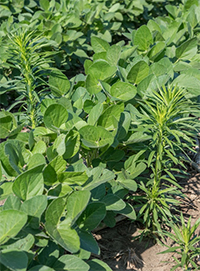 Challenging weather conditions ahead of spring planting can result in beans getting in the ground late, or worse yet, not at all. Wet conditions not only make delays likely but also earlier weed emergence. The weather combination of significant rainfall and warmer-than-normal temperatures in particular can lead to an increase in early season weed emergence.
Challenging weather conditions ahead of spring planting can result in beans getting in the ground late, or worse yet, not at all. Wet conditions not only make delays likely but also earlier weed emergence. The weather combination of significant rainfall and warmer-than-normal temperatures in particular can lead to an increase in early season weed emergence.
Jason Gibson, a Corteva Agriscience market development specialist based in Nebraska, says it’s all part of a larger trend he’s seeing.
“The weather we’re experiencing in the spring is more frequent rain and warmer soil temperatures,” Gibson says. “With soil temperatures heating up more quickly, because the frost isn’t as deep, we can expect to see weeds start to emerge a bit sooner.”
That places emphasis on recommending effective preemergence residual herbicides, such as Sonic® herbicide, rather than holding off and relying only on postemergence applications. Those applications may not be as effective if weeds get a strong start.
“We need to be thinking about getting out in the fields and spraying earlier in spring rather than later in the season,” Gibson says. “It’s simply the warmth, plus the moisture is going to equal an increase in early season weed emergence.”
For effective preemergence weed control, consider recommending the two unique modes of action in Sonic herbicide. It is proven to deliver long-lasting residual control on a broad spectrum of weeds. Plus, Sonic offers the flexibility to be applied preemergence up to three days postplant.
Sonic® is not registered for sale or use in all states. Contact your state pesticide regulatory agency to determine if a product is registered for sale or use in your state. Always read and follow label directions.